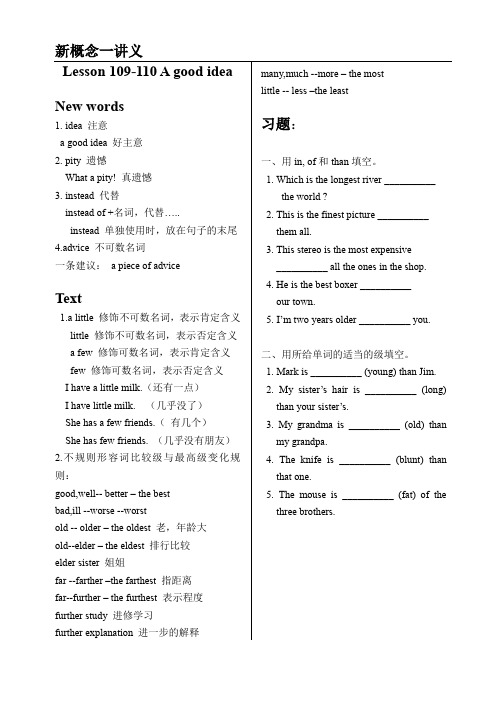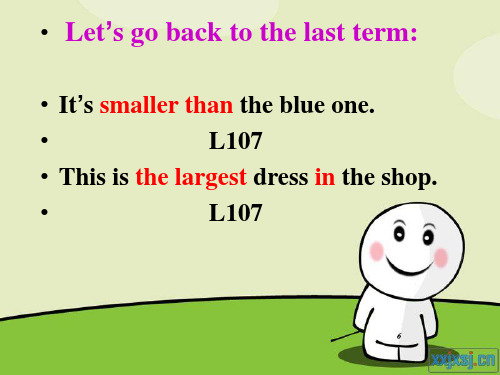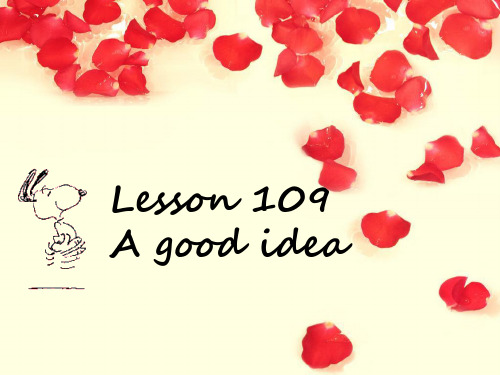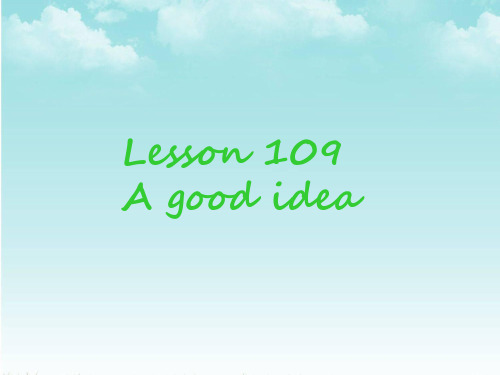新概念英语109课讲义
新概念英语Lesson 109-110讲义

1.a little修饰不可数名词,表示肯定含义
little修饰不可数名词,表示否定含义
a few修饰可数名词,表示肯定含义
few修饰可数名词,表示否定含义
I have a little milk.(还有一点)
I have little milk.(几乎没了)
She has a few friends.(有几个)
She has few friends.(几乎没有朋友)
2.不规则形容词比较级与最高级变化规则:
good,well-- better – the best
bad,ill --worse --worst
old -- older – the oldest老,年龄大
old--elder – the eldest排行比较
2. My sister’s hair is __________ (long) than your sister’s.
3. My grandma is __________ (old) than my grandpa.
4. The knife is __________ (blunt) than that one.
__________ all the ones in the shop.
4. He is the best boxer __________
our town.
5. I’m two years older __________ you.
二、用所给单词的适当的级填空。
1. Mark is __________ (young) than Jim.
Lesson 109-110 A good idea
New words
1. idea注意
新概念英语NCE1_lesson109-110(共25页)课件

little, few, less, least, fewer, fewest
I’ve got little money. I have got less money than you have. I’ve got the least.
I’ve got few books. I have got fewer books than you have.
不规则形容词的比较级 (新1当中出现的)
原级
比较级
good /well better
bad/ill
worse
many/much more
little
less
最高级 best worst most least
形容词比较级和最高级的用法
一般由than引导后面的比较对象。 例:I am younger than you are.
JANE:
I’d like a cigarette, too.
May I have one?
CHARLOTTE: Of course.
I think there are a few in that box.
JANE:
I’m afraid it’s empty.
CHARLOTTE: What a pity!
pity n. 遗憾
e.g. What a pity!真遗憾!
英语中常用“what+a+可数名词”和 “what+不可数名词”来表示感叹。
instead adv. 代替
instead of 代替……
e.g
The pen doesn’t work ,give me that instead.
=Please give me that pen instead of this. 翻译:Have a biscuit instead!
新概念英语1第109课A good idea 课件ppt

【课文】
CHARLOTTE: Shall I make some coffee, Jane? JANE: That's a good idea, Charlotte. CHARLOTTE: It's ready. Do you want any milk? JANE: Just a little, please. CHARLOTTE: What about some sugar? Two teaspoonfuls? JANE: No, less than that. One and a half teaspoonfuls, please. That's enough for me. JANE: That was very nice. CHARLOTTE: Would you like some more? JANE: Yes, please. JANE: I'd like a cigarette, too. May I have one? CHARLOTTE: Of course. I think there are a few in that box. JANE: I'm afraid it's empty. CHARLOTTE: What a pity! JANE: It doesn't matter. CHARLOTTE: Have a biscuit instead. Eat more and smoke less! JANE: That's very good advice!
pity n. 遗憾
feel pity for =take/have pity on 同情 What a pity!
instead
新概念第一册109课(ppt课件)

going by car.
学习交流课件
7
a few 表示可数,几个
There are a few trees。
little 表不可数,几乎没有,表否定
I slept very little last night
few 表可数,几个
Few people understand the difference.
Few students learn La学习t交i流n课件now.
Do you want any milk?
肯定句用“some”,否定句疑问句用
“any”,如果是用在请求的句子里,
some不用变成any。some可修饰可数/
不可数名词。
学习交流课件
3
ห้องสมุดไป่ตู้
Just a little ,please.
a little 表不可数,少许
There is a little water。
lesson 109 A good idea
学习交流课件
1
less 较少的 least 最少的 at least 至少
instead 代替 instead of 代替,后跟动名词 in place of 代替
advice 建议,不可数名词
a piece of advice 一条建议
ask for advise 征求意见
学习交流课件
6
Have a biscuit instead.
用在句末或者句首。 Lee was ill so i went instead.
instead of用在句中,因为of是介词,所 以后跟动名词
We just had soup instead of a full
新概念英语第一册109-110课件

language point : 形容词的比较级和最高级
不规则变化:(多少、好坏) many/much-more-most few/little-less-least
good/well-better-best bad/ill/badly-worse-worst
far-farther/further-farther/furthest old-older/elder-oldest/eldest
I will make some coffee for you. some通常用于肯定句,而在疑问句中要变成any,但 是在征询意见的问句中仍用some。
新概念英语第一册109-110课件
夏洛特:咖啡好了,你要放点奶吗? CHARLOTTE:It‘s ready. Do you want any milk? 简:请稍加一点。 JANE:Just a little, please.
There is little coffee in the cup.
eg.我请老师对我的英语学习给些建议。
The doctor advised me to take a week’s rest.
advise that…
eg. I advised him to stop smoking.
= I advised that he stop smoking.
give sb a piece of advice / offer sb a piece
我因她的无助而觉得她可怜 I pity her for her helplessness.
新概念英语第一册109-110课件
2)v. 令人觉得怜悯,同情 feel pity for =take/have pity on 同情 eg: I pity her for her helplessness.
新概念英语第一册第109-110课课件

★smoke v. 抽烟
• ① v. 抽(纸烟、烟斗等) • He smokes cigars. 他抽雪茄。 • ② v. 冒烟;冒雾气
• She could see a chimney smoking in the nearby village.
• 她可以看到附近村子里的烟囱在冒烟。 • ③ v. 熏制(鱼肉等) • Do you know how to smoke hams? 你知道
★a little 少许 ★a few 几个
• a little 修饰不可数名词,表示肯定含义; • little 修饰不可数名词,表示否定含义
• I have a little milk.
• I have little milk. • a few 修饰可数名词,表示肯定含义; • few 修饰可数名词,表示否定含义
adv. 代替 n. 建议,忠告
★idea n. 主意
• idea 含义较广,主意,想法,各种看法 • I have a good idea. • opinion 对某事具体的看法、观点、想法 • in one's opinion 在我看来 • thought 成系统的思想 • view 侧重个人意见 • viewpoint 观察视点
Lesson 109 A good idea
words
idea pity a little teaspoonful less a few instead advice
n. 主意 n. 遗憾 少许(用于不可数名词之前)
n. 一满茶匙 adj. (little的比较级)较少的,更小的 几个(用于可数名词之前)
decided to become a singer. • ② adv. 代替,而不是(of) • She wanted to have milk instead of juice. • She prefers buying books instead of borrowing them
新概念英语1第109课A-good-idea-课件ppt

little, few, less, least, fewer, fewest
I’ve got little money. I has got less money than you have. I’ve got the least.
I’ve got few books. I have got fewer computers than you have.
I have got the fewest.
不规则形容词的比较级
原级
比较级
good /well better
最高级 best
bad/ill
worse
worst
many/much more
most
little
ther/further farthest/furthest
名词数量的比较
• 变化规则: • 1.一般形容词后直接加est,(tallest) • 2.以元音加辅音结尾的,双写最后一个字母,
再加est,(biggest) • 3.以辅音加y结尾的,变y为i,再加est.
(heaviest). • 4.以e结尾的,直接加st. (largest)
Can you tell me how many books/money you have got?
Lesson 109 A good idea
Topic:
What would you like when you are having coffee? Milk? Sugar? Cigarette? Biscuit?
A piece of advice Eat more and smoke less!
language points
practice
新概念1 Lesson109-110 课件

肯 a little
定 a few 否 litless adj. (little的 比较级)较少的,
更小的
less than…
least adj.
(little的最高级)最小的,最 少的
It’s too small.
ASSISTANT: Do you like this dress, madam?
LADY:
I like the colour very much.
It's a lovely dress, but it's too small for me.
ASSISTANT: What about this one?
• instead [in'sted] adv.代替 • I don’t have any beer. • I would like to have a cup of coffee, instead.
• advice [əd‘vais] n.建议,忠告 [U] • 一条建议 • a piece of advice
比较级 better更好的
bad差的,ill坏的
worse更差的;更坏 的
many/much多的
more更多的
little少的
less更少的
最高级 best最好的 worst最差的;
最坏的 most最多的
least最少的
比较级和最高级的构成
不规则变化
原级
比较级
最高级
old 年老的; older较老的;较旧的 古老的
Lesson 109 A good idea
- 1、下载文档前请自行甄别文档内容的完整性,平台不提供额外的编辑、内容补充、找答案等附加服务。
- 2、"仅部分预览"的文档,不可在线预览部分如存在完整性等问题,可反馈申请退款(可完整预览的文档不适用该条件!)。
- 3、如文档侵犯您的权益,请联系客服反馈,我们会尽快为您处理(人工客服工作时间:9:00-18:30)。
Lesson 109 a good idea讲义重点
一、本课重要单词
Idea:主意;意见,见解,想法;
That's a good idea. 那是一个好主意。
What is your idea about it? 关于这件事你的意见如何?
a little:少许,有一点,表示肯定意义;
little:几乎没有,很少,表示否定意义。
little与a little修饰不可数名词。
There is a little wine left in the bottle. 瓶子里还剩一点酒。
There is little wine left in the bottle.瓶子里没剩下多少酒。
teaspoonful: 一满茶匙;a teaspoonful of sugar 一茶匙糖; less: 较少的,更少的,是little和few的比较级。
a few:一些,几个;few:几乎没有;few和a few主要用来修饰可数名词;例:
A few children were in the room. 房间里有几个孩子。
Few children were in the room.房间里几乎没有孩子。
pity:遗憾; What a pity! 真可惜,实在可怜。
Instead:代替;掌握关于instead的一个重要短语,instead of 代替….,而不…..
I have to finish my work instead of going out.
我必须完成工作而不是出去玩。
advice:建议,忠告;掌握关于advise的短语,give some advice:提出建议;take the advice 听取建议;
二、本课重要知识点
1. I think there are a few in that box.
我想那个盒子里有一些。
在本句中需要掌握there be句型及few/little的用法:
(1)there is+可数名词的单数或不可数名词,例:
There is some water in the bottle.瓶子里有一些水。
(2)there are+可数名词的复数,例:
There are a lot of children in the classroom.
教室里有很多孩子。
(3)a few:一些,几个,肯定意义,表示“有”的意思,few:很少,否定意义,表示“没有”,few/a few均修饰可数名词:I met a few of my friends in Paris.
在巴黎我碰见我的几个朋友。
Few of us know the truth.我们中几乎没有人知道真相。
(4)a little:有一点,有一些,肯定意义,表示“有”的意思;little:很少,几乎没有,否定意义,表示“没有”,little/a little 均修饰不可数名词:
Come in and have a little milk. 进来喝点牛奶。
We got little help from them.
我们没有从他们那儿得到什么帮助。
2.本课重要语法:可数名词与不可数名词
英语中名词分为可数名词与不可数名词两种,可数名词是指可以用数目计算的名词。
可数名词有单复数之分。
不可数名词是指不可以用数目计算的名词,不可数名词没有单复数之分。
不可数名词在表示“一个”的概念时,就必须用表示量的名词词组,例:a piece of paper:一张纸;a piece of news:一条新闻;a piece of cheese 一块乳酪;a bar of chocolate 一块巧克力;等等。
最常见的不可数名词有:advice, change(零钱), furniture(家具), hair, homework, information(信息), knowledge, luggage (行李), money, news, progress, traffic等等;
可数名词与不可数名词用法如下:
(一)可数名词的用法:
可数名词有单数和复数两种形式。
指一个人或一件事物时,用单数形式;指两个或多个人或事物时用复数形式。
名词由单数形式变成复数形式的规则变化如下:
①大多数的可数名词的复数形式,是在该词末尾加上后辍-s。
例:friend→friends; cat→cats;
②是以s、x、ch、sh结尾的词,在该词末尾加上后辍-es,构成复数。
例:bus→buses; fox→foxes; match→matches;
③以辅音字母+y结尾的名词,将y改变为i,再加-es。
例:family→families;fairy→fairies; lady→ladies;
④以-o结尾的名词,一般直接加s,例:
zoo →zoos; radio →radios;
video →videos; piano →pianos; photo →photos;
以下几个一般常加-es: 黑人Negro英雄hero喜欢吃西红柿tomato和马铃薯potato。
⑤、以-f或-fe结尾的名词,多为将-f或-fe改变为-ves,例:knife→knives; life→lives;
leaf→leaves; staff(员工)→staves;
不规则变化:
child---children foot---feet tooth---teeth
mouse---mice man---men woman---women;
deer---deer,sheep---sheep,fish---fish,Chinese---Chinese,Japanese---Japanese;
(二)不可数名词的用法:
(1)不可数名词不能与a/an连用而且没有复数形式,只有单数形式,some bread,a little milk,a little water; some soup;(2)不可数名词作主语,谓语动词用作单数,即使与some/any等连用也是单数形式,例:
The food is very fresh.食品很新鲜。
There is some milk in the cup:杯子里有一些水;
There is not any water in the bottle:瓶子里没有水了;
(3)不可数名词经常需要“量化”,量化后的单复数是由量词来决定的,例:
There is a bar of chocolate on the plate.
盘子里有一块巧克力。
There are two cups of tea on the table.
桌子上有两杯茶。
There are three bottles of milk in the fridge.
冰箱里有三杯牛奶。
(4)对可数名词前的修饰语提问用how many; 对不可数名词前的修饰语提问用how much。
例:
How many apples are there in the box?
盒子里有多少个苹果?
How much tea is there in the cup?
杯里有多少茶水?。
